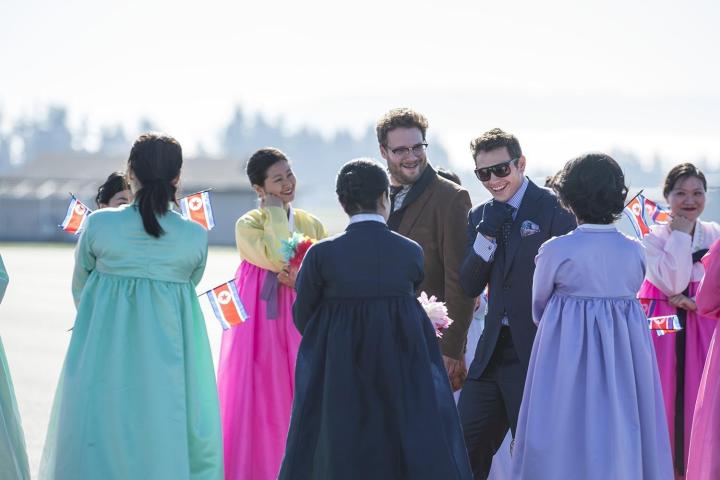
- The Interview has made six times more online than at the box office
- Who needs movie theaters anyway?
- Why Sony’s digital release of The Interview changes the game
- Amazon announces plans to release movies in theaters
Did you spot the one that doesn’t belong?
From the moment Sony decided to release The Interview digitally, film industry pundits have been all too happy to declare “victory” for online streaming over traditional theatrical distribution. As the movie’s revenue reports rolled in — first $15 million, then $31 million, and now $40 million as of this writing — the figures only bolstered their enthusiasm. The theatrical experience is dying, they say, and The Interview’s success is only going to hasten their demise.
And then Amazon shattered that narrative this week by embracing the very medium it is credited with helping to kill.
We live in an age where any kind of theatrical release, even one that isn’t profitable, gives a tremendous boost to a film’s value overall.
Why would Amazon make such a bold commitment to a pricey, antiquated distribution method? Why would it want to share revenue with exhibitors when it already owns a direct portal to millions of homes? Why take a giant step back when everyone knows the future is streaming?
First, let’s look at the money generated from The Interview’s digital release, comparing it to the wide release it never got in theaters. The formulas that decide the split between movie studios and exhibitors are actually quite complex. How much a studio makes off each ticket sold changes depending on how long the movie has been out, how popular the movie is expected to be, and even where the theater itself is located. For most movies the studio-theater split winds up in the ballpark of 50/50. Had The Interview been released traditionally and made the same $40 million, Sony would really only be able to pocket $20 million. Digitally, the split is closer to 70/30, which means that same $40 million gross nets the studio closer to $28 million. Advantage streaming, right?
Not really. Let’s not forget that The Interview had more attention and free press than any movie in recent memory. There was also a patriotic imperative to see it. It’s great that The Interview is in range of recouping back its production budget after all the turmoil, but not losing money hardly makes it a game changer. Even if The Interview turns out to be quite profitable, the film will always be a poor test case thanks to the special circumstances of its release. It literally took a terrorist threat to force Sony to go digital, and it’s going to be a while before we see that same decision with another high-profile feature.

The good news for people who hate going to theaters, though: The Interview is doing well enough that it’s still a positive development for the continued growth of streaming. But compare that to Seth Rogan’s other headlining feature from this year, Universal’s Neighbors, which made $49 million in its first weekend alone and is on its way to a worldwide gross of nearly $270 million. The ceiling for theatrical success is still much higher than a digital release.
Which takes us to this week’s Amazon announcement. Amazon plans to release up to twelve movies per year in theaters before bringing those films to its Prime streaming service. Is the company gambling on finding a Neighbors-like hit? Not likely. It sounds like Amazon’s plan is closer to what The Weinstein Company did with the vastly underseen Snowpiercer than anything else. Amazon will identify a handful of films that could be received well critically, release them very strategically (and cheaply) in select markets, then use that attention to boost the film’s profile for home viewership.
Financial success in theaters is entirely a secondary goal. Remember: We live in an age where any kind of theatrical release, even one that isn’t profitable, gives a tremendous boost to a film’s value overall. When people sit down to watch something at home, they still think about the commercials they saw on TV months earlier, the praise the film received from friends and critics, and any awards the film might’ve gotten. Amazon just won a Golden Globe for its TV series Transparent, but if it wants to win similar accolades for its films, it needs to release them in theaters to even be eligible for most awards. Sidestepping a theatrical release to save a little money can be very costly in the long-run.

Amazon’s shareholders care about subscribers, not viewers. Whether or not you actually watch a given movie on the service is less important than you signing up (and paying $10 a month) because you might watch it. That’s why HBO and Showtime keep some buzzed-about shows on the air despite relatively small actual viewership. If Amazon can point to a dozen theatrical films that will only be available on Prime, that’s a major selling point, regardless of how many people actually saw them. And if an Amazon-produced movie just happens to make some money the old fashioned way or become a Neighbors-like hit? Icing on the proverbial cake.
Predicting the death of movie theaters makes for some clickable headlines. Tickets are expensive. Cell phones are distracting. Commercials are annoying. Few will argue with the fact that the experience isn’t what it used to be. But companies like Amazon don’t make decisions based on headlines or even popular sentiment. They use data. And right now the data still finds great value in a theatrical release.
(Just not for ticket buyers.)


